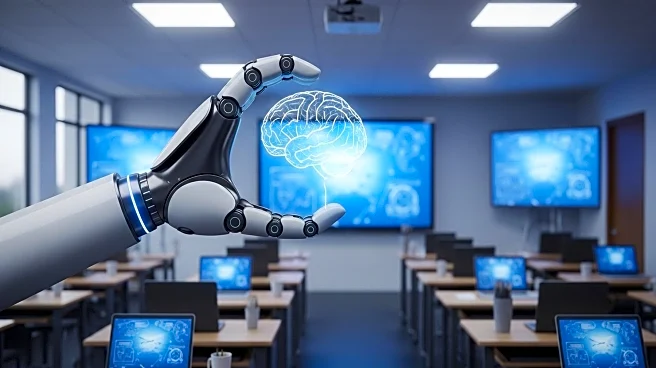What is the story about?
What's Happening?
Georgia is implementing a comprehensive initiative to integrate artificial intelligence (AI) into various sectors, including manufacturing, agriculture, and education. This effort, known as Georgia AIM (Artificial Intelligence in Manufacturing), is part of a $65 million federal initiative aimed at developing a workforce adept in AI technologies. The state already boasts over 200,000 manufacturing jobs, with more than 70% utilizing automation or smart technology. By 2030, it is projected that half of factory tasks could be automated. However, experts warn that millions of tech-enabled jobs may remain unfilled unless students receive appropriate training. Programs like EarSketch, which allows students to create music using AI-generated beats, are part of this educational push. The initiative also includes partnerships and investments to build a robust future workforce, with opportunities for apprenticeships and certifications in manufacturing.
Why It's Important?
The integration of AI into Georgia's workforce is crucial for maintaining competitiveness in a rapidly evolving technological landscape. As automation becomes more prevalent, the demand for skilled workers who can manage and innovate with AI technologies will increase. This initiative not only addresses the potential skills gap but also positions Georgia as a leader in AI workforce development. By equipping students with the necessary skills, the state aims to prevent job displacement and ensure economic growth. The initiative also highlights the importance of education in adapting to technological advancements, providing students with opportunities to engage with AI in practical and creative ways.
What's Next?
Georgia AIM Week continues with events across the state, from Savannah to Carrollton, focusing on furthering AI education and workforce development. The initiative will likely lead to increased collaboration between educational institutions and industries, fostering an environment conducive to innovation and economic growth. As the program progresses, it may serve as a model for other states looking to integrate AI into their workforce strategies. The success of this initiative could influence policy decisions and encourage further investment in AI education and training nationwide.
Beyond the Headlines
The ethical implications of AI integration in the workforce are significant. Ensuring that AI technologies are used responsibly and equitably is crucial. The initiative must address potential biases in AI systems and ensure that all communities have access to the benefits of AI advancements. Additionally, the cultural shift towards AI-driven industries may require changes in educational curricula and workforce training programs to emphasize critical thinking and adaptability.
















